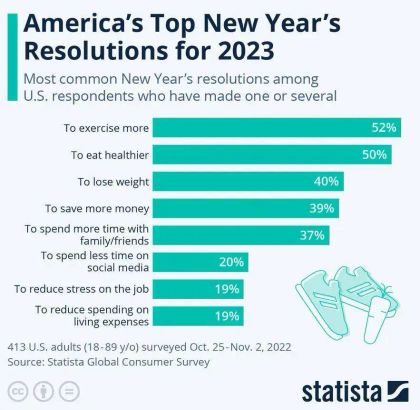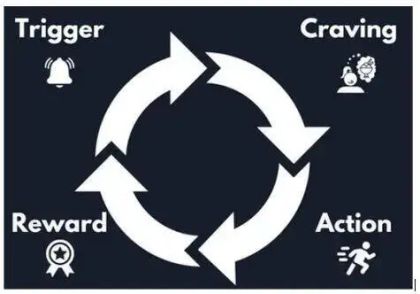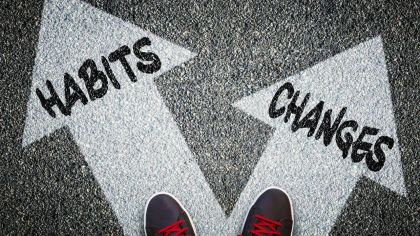"You don't get what you want, you get your habits!"
This concept, learned from my coach, transformed how I view goals.
Consider your own life:
You don't wake up one day in amazing or terrible shape.
It's a gradual process, often unnoticed.
The good news is, regardless of your goal's current feasibility, you can achieve it:
Just identify the right habits that align with your goal and cultivate them.
But how do you do it?
How do you handle resistance and stay on track?
That's what you'll discover in this newsletter—a no-B.S. guide to building the right habits for your dream physique, free from the yo-yo effect.
Did you already quit?
The end of January is approaching.
Statistically, 80% already failed their New Year’s resolutions by now.

How is that possible?
A few weeks ago, the same people felt highly motivated to change their life in 2024.
It all comes down to habits.
The truth is, you can't depend on fleeting feelings because they change rapidly, and relying on them leads to quitting.
What you can rely on, however, are your habits.
Here are 3 core things you need to know about habits if you want to optimize them:
Habits are subconscious & brain-based
Researchers at the Max Planck Institute in Germany found that your brain fires before you consciously engage in a habit.
This shows that habits are subconscious processes.
You can easily see this in your daily life:
For instance, when you brush your teeth, are you consciously engaged or just going through the motions?
You've been doing it for years without much thought.
Habits even reshape the brain by forming "Neural Pathways."
Think of habits as an autopilot plane:
To reach a new destination, you must first become aware of the autopilot, and then reset it.
Habits are built through repetition
Think back to when you first learned to drive:
Initially, everything felt overwhelming.
Every action required conscious effort, like using the brakes and blinkers while the instructor talked to you.
Now, you drive effortlessly, even while eating a snack, switching radio channels and talking to your partner.
How did you reach this point?
Through repetition:
Your brain automated the necessary actions, turning driving into a habit.
The same applies to other automatic behaviors:
Even walking, which was once a struggle but became second nature.
To build a habit, you have to make the behavior repeatable.
Habits happen in stages
Habits consist of more than just the behavior.
There are four components:
- Trigger
- Craving
- Action
- Reward
Let’s have a quick look at each:
1) Trigger
A trigger is like an alarm clock:
It tells your brain that it’s time to engage in the habit.
This can be anything: Locations, certain times throughout the day, people, but also internal factors like thoughts or emotional states.
2) Craving
Cravings are thoughts and feelings that aim to maintain the habit.
Your brain prefers the status quo to save energy.
When trying to establish new habits, your brain initially resists with thoughts like "I'll do it tomorrow," "I don't have time," or "I'm too tired today," along with discomfort or anxiety.
This is where many people falter (I'll guide you on how not to).
3) Action
This is the behavior itself.
For a habit to form, it has to be doable!
Take scrolling on your phone as an example:
If your phone isn’t available when you get the cravings, you won’t do it.
4) Reward
Every habit has a reward - even “bad” habits.
Take eating junk food as an example:
A lot of people engage in that habit to cope with stress and discomfort.
Building new habits is easy if there’s a strong enough reward.
Those 4 stages of a habit create a reinforcing feedback loop

To build a habit, you must consider all these stages and incorporate them into your habit-changing process.
Here’s how to do this:
How to build any habit in 21 days
I used this process to build the habits of:
- Eating healthy
- Working out
- Getting up early
- Networking
- Recording
- Meditating
- Writing
No matter what habit you're trying to build, this process will work for you - if you stick to it.
1) Outline your vision & tie it into your values
Arnold Schwarzenegger had to cut down from 245 lbs to 210 lbs to star in a movie.
Here’s what he said:
“I started seeing myself as a lean athlete. That’s the only way I could get myself interested in running”.
Building habits takes some work - you need a vision that’s worth it.
For example, building a meditation habit was much harder for me than working out.
Why?
Because it took me years to truly realize the benefits of meditation.
The benefits of working out, on the other hand, were obvious to me from day one.
Here are some questions that will help you:
- Why is this important to you?
- What will the habit do for you?
- How will this habit change your life?
- How will it affect the people around you in a higher way?
I go into much more detail about goal-setting and leveraging your top values in this article (recommended read).
Remind yourself of this when things get tough and your brain tries to talk you out of your new habit!
2) Choose the #1 habit with the highest leverage
Building habits takes time, so you have to be smart about what habits you start building.
Ideally, you start with the habit that has the highest impact on your goal.
Here are some examples:
- Working out
- Eating protein
- Drinking water
Don’t make the mistake of trying to build too many habits at once - it will not work.
Start with one, then go onto the next after it gets comfortable.
A good rule of thumb is to stick to one behavior until you no longer have to think about it.
Then, move on to the next.
3) Break it down as far as necessary
“The only way to eat an elephant is one bite at a time” - Desmond Tutu
Here’s a sure recipe for failure:
Try to go from not working out at all, to lifting 6 times a week.
Remember that the behavior needs to be repeatable if you want to turn it into a habit!
If your initial plan turns out to be too much, break it down:
- If you can’t do 100 pushups, do one pushup
- If you can’t meditate for 30 minutes, do one minute
- If you can’t eat 100% clean, start with one clean meal
I did the exact same thing:
- I started working out with 1 pushup
- I started meditating with 1 minute
- I started writing with 100 words
At the start, it should almost feel insignificant.
Once you get used to the routine, you can increase the workload.
4) Set a cue for the new habit
You can use locations, time points, people, or other environmental cues.
This helps to anchor the habit and acts like an alarm clock.
You can make this even more effective by using the technique of “habit stacking”:
Habit stacking means that you do your new habit right after an already existing behavior.
You will get the most benefits by combining as many cues as possible.
Here are some personal examples:
- Drinking water at 6 am after getting out of bed and turning off the alarm
- Meditation in the infrared sauna, after my workout
- Starting to write after brushing my teeth
5) EXECUTE CONSISTENTLY for a minimum of 21 days
Start TODAY!
If you’re thinking “I’ll do it tomorrow”, your brain is already talking you out of the habit.
When you catch yourself rationalizing excuses like bad timing or circumstances, remember your vision.
Shift your attention to what you want to create, and the values you appeal to with your new habit.
That’s where true, intrinsic motivation is found.
Also, keep a habit tracker:
This could be an app on your phone, but I’ve found it more effective to print it on a sheet of paper and glue it to my door.
Seeing my process every day acts as a huge motivator (growth is one of my top values) and it keeps me on track.
Your habit statement
Let’s make it even more concise:
Take the habit you want to build and write out a statement in this form:
When CUE, I will ROUTINE because it provides me with REWARD.
Here are some examples:
- When I get out of bed, I will drink 1 glass of water because it provides me with energy.
- When I get home from work, I will go for a walk because it helps me to relax and wind down.
- When I am done with my breakfast, I will write 500 words because it helps me grow my business.
Remind yourself of this mantra throughout the day.
If you're a driven entrepreneur or creator and looking to:
- Efficiently manage stress for better health and productivity
- Drop up to 20 lbs in 90 days, without the diet-hamster-wheel
- Reach your dream physique in just 2 hours per week
Click HERE for a free 30-minute strategy call where I'll show you exactly how it works

